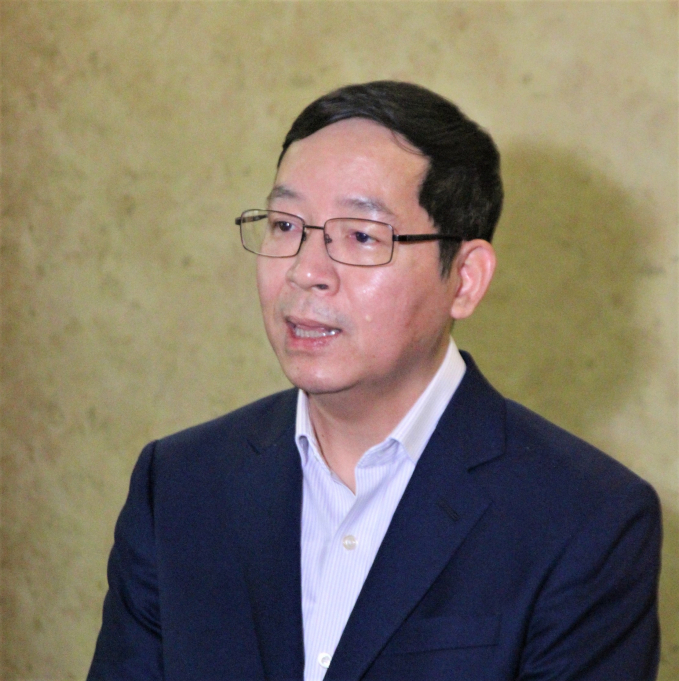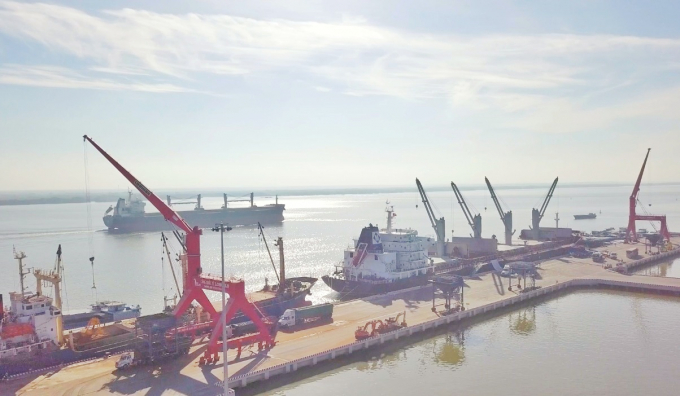May 24, 2025 | 16:25 GMT +7
May 24, 2025 | 16:25 GMT +7
Hotline: 0913.378.918
May 24, 2025 | 16:25 GMT +7
Hotline: 0913.378.918

Dr. Vu Thanh Tu Anh, Director of the Fulbright School of Public Policy and Management, Fulbright University Vietnam. Photo: Kim Anh.
According to Dr. Vu Thanh Tu Anh, Director of the Fulbright School of Public Policy and Management, Fulbright University Vietnam, localities in the Mekong Delta are currently dominated by tenure. But the economy of the country in general, the Mekong Delta in particular, as well as each province and city, the administrative and economic boundaries often overlap. Therefore, the Mekong Delta has been planned to break these boundaries. "When breaking the boundary of space and prolonging the time, a fuller and more in-depth view of development will surface.”
The ecological zones in the Mekong Delta are divided into 3 large regions, 14 small regions and 36 sub-regions. These regions and sub-regions will have a degree of industry specialization. By looking at the master plan localities will have an overview of the general picture of the whole region and each locality so that they can have a more appropriate way to operate.
The role, voice and participation of businesses and people are also considered important factors. It will create motivation for the successful implementation of the plan If people and businesses see the same benefits.
In the context that this is the first regional planning of the country, it poses many difficulties. Dr. Vu Thanh Tu Anh added that many of the general orientations of the country are not clear, regional planning has to always "put the cart before the horse". And the big problem of regional planning is to go hand in hand with resources on human, financial, investment, organization and institutions to implement the planning.
the planning of agricultural hubs is a typical example. The Mekong Delta will invest in building 8 agricultural product hubs, including 1 general center and 7 industry centers for rice, fruit, seafood, and other products. But the problem posed by Dr. Vu Thanh Tu Anh is the rationality of these centers’ structure. Localities may see this arrangement of centers as suitable or there would competition or even conflict of interest between them. "it is very difficult to immediately see the effect from the planning process,” said Dr. Vu Thanh Tu Anh.
Moreover, when implementing the plan, it is necessary to integrate many different plans, such as planning for land, infrastructure, transportation, and energy. But this integration is also difficult because of its nature. And Dr. Vu Thanh Tu Anh affirmed that there must be adjustments and struggles in practice.

Long An International Port. Photo: Kim Anh.
With an integrated approach for planning, an overall, logical and internal picture of the Mekong Delta region has been clearly outlined. Policies, if properly implemented, will not be opposite or contradict each other. The Mekong Delta planning has prioritized infrastructure development, especially transport infrastructure. This is a weak issue, considered one of the basic bottlenecks of the delta economy.
Logistics centers are also given many favorable conditions to develop, especially through the formation of focal centers which link logistics-related centers with services such as finance, science, and infrastructure, and combine with belts and corridors in terms of urban areas, industrial parks and specialized farming areas.
From Dr. Vu Thanh Tu Anh’s point of view, if looking at the land use planning, there is not much fiscal space to resolve the issues above. It is difficult to change the purpose of land use and arrange the space for concentrated material areas.
“Regarding our situation of arable land, 50% of farmers only have less than 0.5 ha. it would prove to be very difficult to have a specialized farming area. Combining the development of focal centers associated with urban areas is also not an easy feat because for a long time we have known that industrial parks are often separated from urban areas, but now they are firmly attached to each other,” said Dr. Vu Thanh Tu Anh.
Solving the problem in the delta is not only a matter of resources or labor, but an equally fundamental point is to build a synchronous infrastructure with a good institution for the Mekong Delta region, creating a good and suitable business environment. If so, Vietnam will have a more vibrant Mekong Delta region, with more job opportunities, and higher living standards. In other words, it's a place worth living, birds perch the safe land, people return, businesses arrive.
Translated by Samuel Pham

(VAN) The mutual export of agrifood products between the European Union (EU) and the United Kingdom (UK) must occur again without certification, border controls or other red tape. This was agreed at the UK-EU summit.
/2025/05/22/5121-2-173645_677.jpg)
(VAN) NBSAP Tracker identifies strengths and areas for improvement in the National Biodiversity Strategy, based on each region’s priorities and capacities.

(VAN) The draft amendment to the Circular on rice export trading stipulates a periodic reporting regime for rice exporting enterprises.

(VAN) Dong Thap farmers attained an average profit margin of 64% during the summer-autumn 2024 crop (first season), while An Giang and Kien Giang farmers followed with 56% and 54%, respectively.

(VAN) As a doctoral student doing research on renewable energy and electrification at Harvard University, the author shares his musings on electricity, nature, and countryside memories.

(VAN) The decree on Extended Producer Responsibility (EPR) ensures transparent management and disbursement of support funds, avoiding the creation of a “give-and-take” mechanism.

(VAN) Hue City rigorously enforces regulations regarding marine fishing and resource exploitation, with a particular emphasis on the monitoring of fishing vessels to prevent illegal, unreported, and unregulated (IUU) fishing.